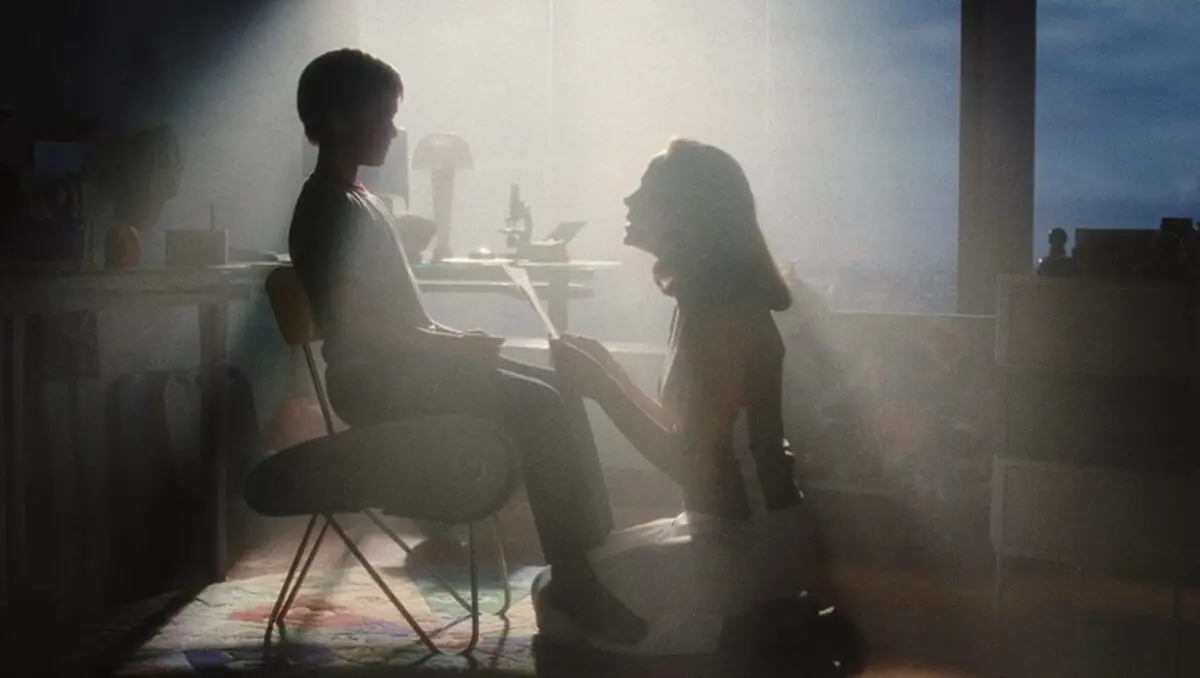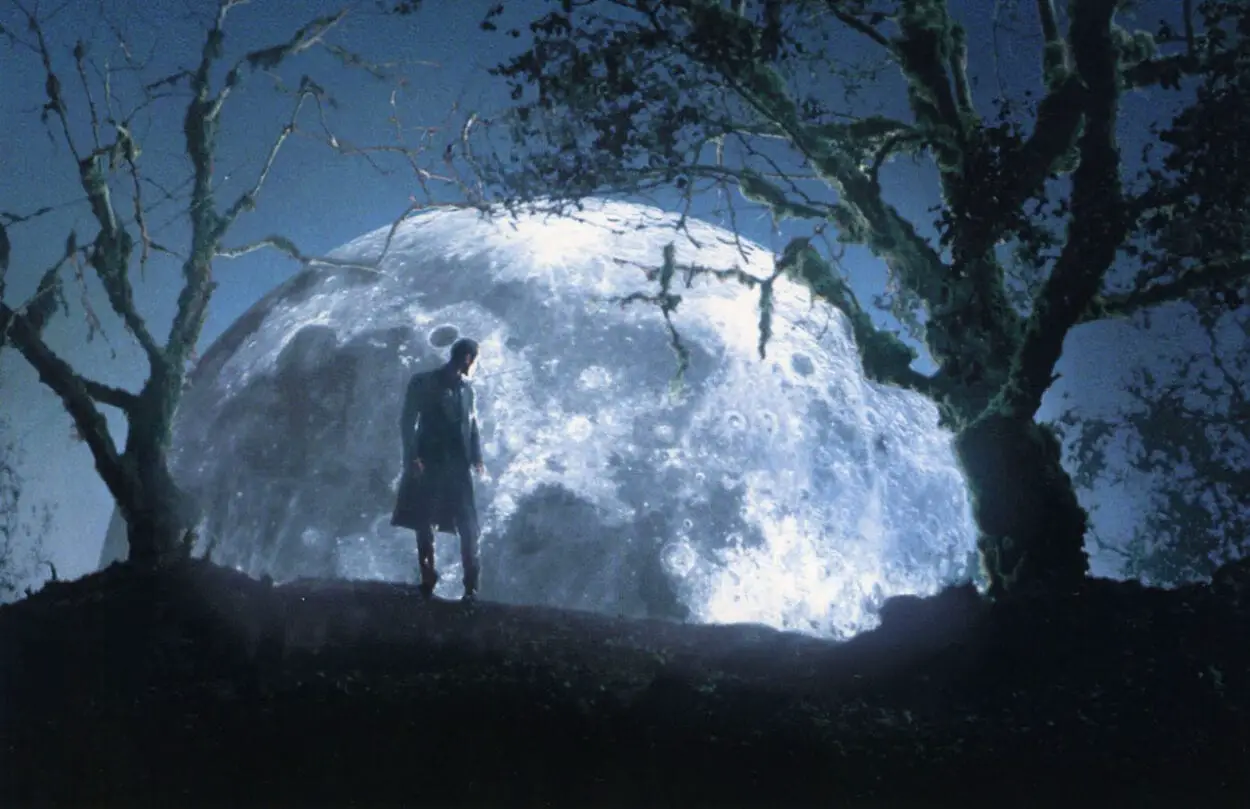What struck me about A.I. Artificial Intelligence when I was 20 was its strange blend of Kubrick’s trademark slow methodical pacing and frantic Spielberg edited action spectacle. I expected the coldness of 2001: A Space Odyssey, what I got was a Sci-Fi melodrama about an innocent Mecha child trying to become a real boy so he can return to his mother. His fate seems sealed, when just short of two hours he is crushed between a Ferris wheel, staring at a Coney Island fairground statue of a blue fairy, wishing to be a real boy. The shot starts to pan out. The audience gets ready to leave their seats.
But then Ben Kingsley says, “Thus 2000 years went by” and the film cuts to a sweeping tracking shot above the ice of frozen Earth. The audience then clench their sphincters for what they would presume is a brief epilogue. This epilogue goes on for 30 minutes. The overall impression: great film, shame about the ending.
Watching it as a 39 year old father, A.I. no longer seemed to be a melodrama; it is more a psychological horror about an 11 year old Mecha stalker created by a conman. In this context the ending rather than tacked on feels more like the natural conclusion, even if some elements of it are badly handled. Rather than being too long, the film feels too short, with too many loose ends needing wrapping up.
Stanley Kubrick spent many years trying to adapt Brian Aldiss’s 1969 short story Supertoys Last All Summer Long. The script went through many treatments, including one by Aldiss himself, before Kubrick was satisfied enough to start production. But by the mid-90s he gave up, believing no child actor could effectively play David and that CGI was not yet advanced enough to create a realistic human character. So he passed the script to his friend Steven Spielberg as it better suited his sensibility, with the intention of staying on as a producer.
After Kubrick passed away, Spielberg rewrote the script, keeping the opening and final acts largely intact but adding scenes such as the Flesh Fair and—based on a line in a letter he received from Aldiss—the scene where David comes face to face with his robot lookalikes on the factory line. Despite their critical reputations, it was Kubrick who brought the sentimentality and Spielberg the horror.
The most notable change from the original story is that David is no longer five but 11, a choice which allowed Spielberg to cast 12 year old Haley Joel Osment, who riding high on The Sixth Sense was a star in his own right. However, older David still retains a lot of the traits of his five year old counterpart—traits as a parent I now recognise: the inappropriate barging into the toilet when the parent is using it; inexplicable laughter; and the simplistic letter writing. As a 20 year old, this behaviour seemed to show David’s inability to understand social norms, but as a parent having experienced all of the above, I recognise this as regressive and emotionally immature for an 11 year old.
We later learn that David is named and modelled on the dead son of his creator Allen Hobby. Hobby sells his idea of creating a Mecha child that can love to his colleagues as an egalitarian venture: seeking to give love to all the childless couples unable to get a licence to conceive. He defines his machine as the perfect child: one “caught in a freeze frame, always loving, never ill, never changing”. David is effectively a walking and talking version of the photographs that adorn Allen’s desk. Created to dream but as emotionally stunted as his creator, who seems to ignore the darker side of childhood: the tantrums that teach children how to regulate their emotions. His version of love is a perversion that does not allow David to grow, mature, rebel…all things which are healthy in a parent and child relationship. David is set up to fail because his creator can’t move on.
Where once I saw Hobby as a flawed genius, now I see him as the Wizard of Oz conman he is. His justification for making David love unconditionally is that “didn’t God create Adam to love him?” However later in the story he dismisses any belief in the supernatural as being part of the “great human flaw”. He uses religion to hide his true agenda: to bring back his own son. Like Oz he tries to hoodwink David by claiming like for like—that being the first machine to chase down your dreams is more important then bring a real boy, and that you are not as unique as my son was but you are one of a new kind. However, David’s feelings cannot be as easily manipulated as Dorothy’s, so to get away from Hobby he throws himself into the ocean.
In “Supertoys,” David is unaware he is a Mecha, but in A.I., David is aware and believes he is special and unique due to his mother’s love. He is so focused on his mother that he constructs his own reality around her. Other people’s feelings are alien to him. When he accidentally nearly drowns Martin after having the Mecha equivalent of a panic attack, all he can do is lie at the bottom of the pool watching as Martin’s foot twitches back to life. As with everything else, he only ever sees part of the picture. His behaviour resembles that of an obsessed stalker. The main difference is that David’s actions on those around him generally have no malice in them. Yet he remains emotionally detached; only apologising for what happened to Martin when he realises his mother is about to abandon him.

His obsession also makes him unable to differentiate between fairy tales and reality. It’s this vulnerability that Martin exploits, tricking David into cutting his mother’s hair to put in a necklace because he saw it in a movie about a princess. He only knows the world through stories, so when Monica abandons him in the woods with Teddy, he turns to fairy tales to think of a way back:
DAVID: Mommy, if Pinocchio became a real boy and I become a real boy, can I come home?
MONICA: That’s just a story.
DAVID: But a story tells what happens.
MONICA: Stories are not real. You’re not real!
This conversation is key to the whole film because David’s sense of identity now depends on proving fairy tales are real; so he sets off in pursuit of the Blue Fairy. From here on in, he identifies as a boy until his fateful confrontation with his doppelgänger, whom he decapitates with a lamp because he cannot accept his true nature.
The importance of storytelling to help children understand the world is a motif that repeats throughout the film. When Martin is in cryostasis, Monica reads a version of Robin Hood where Marian gives birth to a son also called Martin as a way of explaining how she feels about him. In turn, Martin cruelly picks Pinocchio as a story for his mother to read to him and David, to remind David of his place in the order of things. This is why the Specialists, after reading David’s mind, initially use a simulation of the Blue Fairy to explain what has happened to the world before revealing themselves to him, as they recognise this is how children learn.
David goes from a world of dappled light to dark woods and cities of vice, where other characters also try to will reality to fit their narrow worldview.
Lord Johnson-Johnson scours the woods in his air-balloon, which is disguised as the moon, to trap robots for his Flesh Fairs, where human—or orga as they called in the movie—pay money to see Mecha violently scrapped. He is a religious zealot whose mantra is to “purge yourselves of artificiality” as he (correctly) sees that Mecha will replace them. David saves himself from being burnt by acid by screaming for his life, something Mecha don’t normally do, turning the orga audience against Johnson-Johnson. The irony being that David escapes by following Johnson-Johnson’s own mantra.

Gigolo Joe is a sexbot who imitates the moves of Fred Astaire and can change his appearance to charm his female clientele; claiming a night with him is better than the real thing. He joins David’s quest partly because of loyalty and partly because the Blue Fairy is a woman to be conquered, to prove his sexual prowess.
Joe and Teddy are arguably the most sympathetic characters in the whole story. Teddy is compassionate and loyal to David throughout but gives the impression that he understands more then what he lets on. While Joe is the only one who directly challenges David’s world view (“she loves what you do for her, as my customers love what it is I do for them”) but still follows him to the end of his quest.
When I left the cinema nearly 20 years ago, I thought the Specialists that thawed David were aliens. However, they’re actually advanced Mecha descended from the Mecha in the story. I wasn’t alone in that misconception. Many did and it is both a failure in design—they have long necks, fly around in psychic aircraft and have grey translucent skin—and storytelling.
On rewatch, the clues are there: David is silhouetted by light as he enters the Swinton’s house, which distends his neck like the Specialists. Also Joe prophesies their coming: “They made us too smart, too quick, too many…in the end all that will be left is us. That’s why they hate us”. But it’s too subtle to register. Mecha are on the back-foot throughout so a revolution never seems imminent or inevitable.
Yet this shift should make sense: the homeward journey where the hero returns home triumphant, but changed by the events of the story is a standard story convention. Also David is an unconventional protagonist. His imprinting protocol makes him incapable of feeling anything but love for his mother. Therefore, a traditional reunion at the end would be unlikely to provide the emotional catharsis needed, as he should rightly reprimand his mother. Therefore, the film constructs an alternative homecoming—one 2000 years in the future when the human race is wiped out by climate change—in a house constructed from his own memories. If David can’t argue with his mother then can at least do it with a fairy and a Mecha.

The lead Specialist explains to David that although they can bring back his mother it can only be for one day and then she is gone forever. David wonders whether his mother would be special and may live longer, which the Specialist then politely dismisses as naive, “you were created to be so young”. David then tries to show his maturity by explaining how time is relative and how his day in the amphibicopter felt like it would last forever, and that if the Specialists want for his happiness “then you know what you have to do”. However what is not clear from this exchange is whether David really knows what he is implying? Is he telling him that you must make sure she lives for longer or is he willingly asking him to let him dream/die? It is an ethical conundrum that could implicate the Mecha in mercy killing. Also is David old enough mentally to make the decision, and is his programming able to be changed? The Specialists cannot make art and envy David, so their decision is made on rational belief, and implied consent. Had the final act given the Specialists more screen time, this issue could have been raised, but sadly the final act just concentrates solely on events through David’s eyes.
It resolves David’s arc at the expense of every other character, shrugging them off as unimportant. The Monica brought back has no memory of her real son or husband. She is told what happened to David since she last saw him but doesn’t apologise, acknowledge or explain herself. In the altered reality of the film, you wonder if she is real or a simulation created by the Specialists just to placate David?
It is also not clear whether Hobby continued his research or abandoned it after David went missing. The only clue we have is that the Specialists are after the human “spirit” which they believe may explain the meaning of the existence. This might imply that Hobby’s research was discontinued as the Specialist’s can’t dream like David can. But even if this is the case, Hobby deserves a bigger comeuppance then being proven wrong 2000 years later.
The heart-breaking moment at the end when David closes his eyes is muddied by the next thought—what is going to happen to Teddy? Sitting on the end of the bed watching them asleep, his fate is unremarked on.
Apart from David,the only other character arc that is complete is that of Gigolo Joe: he is put to death for a crime he didn’t commit. It’s a testament to the film that I care enough to want to know what’s next for all these characters, but it makes the finale slightly underwhelming.
A.I. blurs the boundaries between fairy tale and reality; it passes from dream-like to nightmare to a twilight state in-between. To be charitable you could say scenes where David is able to pilot a helicopter, albeit badly, or Hobby leaves David to just wander through the library of his doppelgängers hanging on the wall, have a dream-like logic. Or just call it lazy writing. How you interpret it will depend how much you see the world of A.I. as a psychological horror, in which the world is an externalisation of David’s own inner turmoil, or just as a Sci-Fi themed melodrama?
The cast is uniformly excellent, as are the effects. Even after nearly 20 years of CGI characters, the animatronic Teddy still has the wow factor. It is almost impossible to keep your eyes off him when on screen: his grizzled countenance making each small gesture count. Credit must go to the emphatic and unblinking Osment whose chemistry with Teddy, and all other special effect creatures grounds the whole film. Jude Law plays up to his (then) glamorous playboy image with flare, his loose-limbed performance providing much needed light relief. While France’s O Connor is so haunting as Monica, it makes you pine for a stronger climax for her character, to see what she could have done with it.
At the time of release, A.I. was criticised for sentimentality but looking at the film now it is actually a warning about the dangers of idealising childhood above all other phases of life without acknowledging the darker aspects. What appears to be a fairy tale ending is a compromise, as David switches off and goes to where “dreams are born”; he’s sleeping in a simulation and holding the hand of a woman who is a faded memory of the mother he once loved. She is as close to Monica as David is to Hobby’s dead son. For a Mecha who wanted to be real, his final moments are completely artificial.




